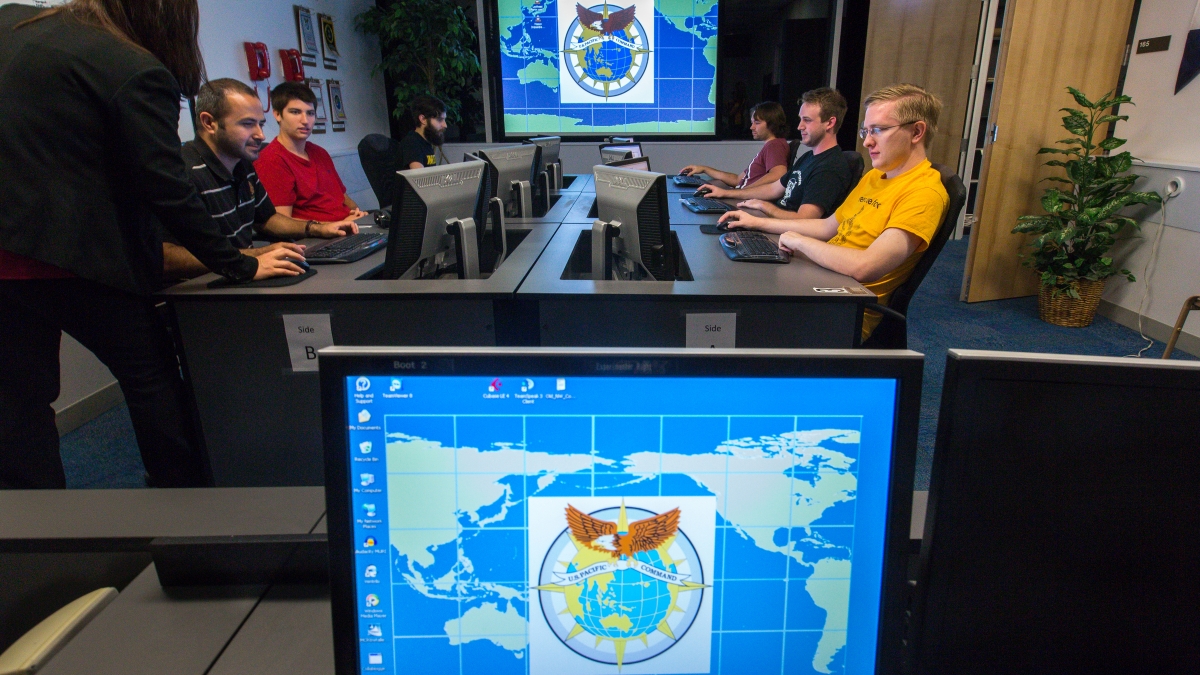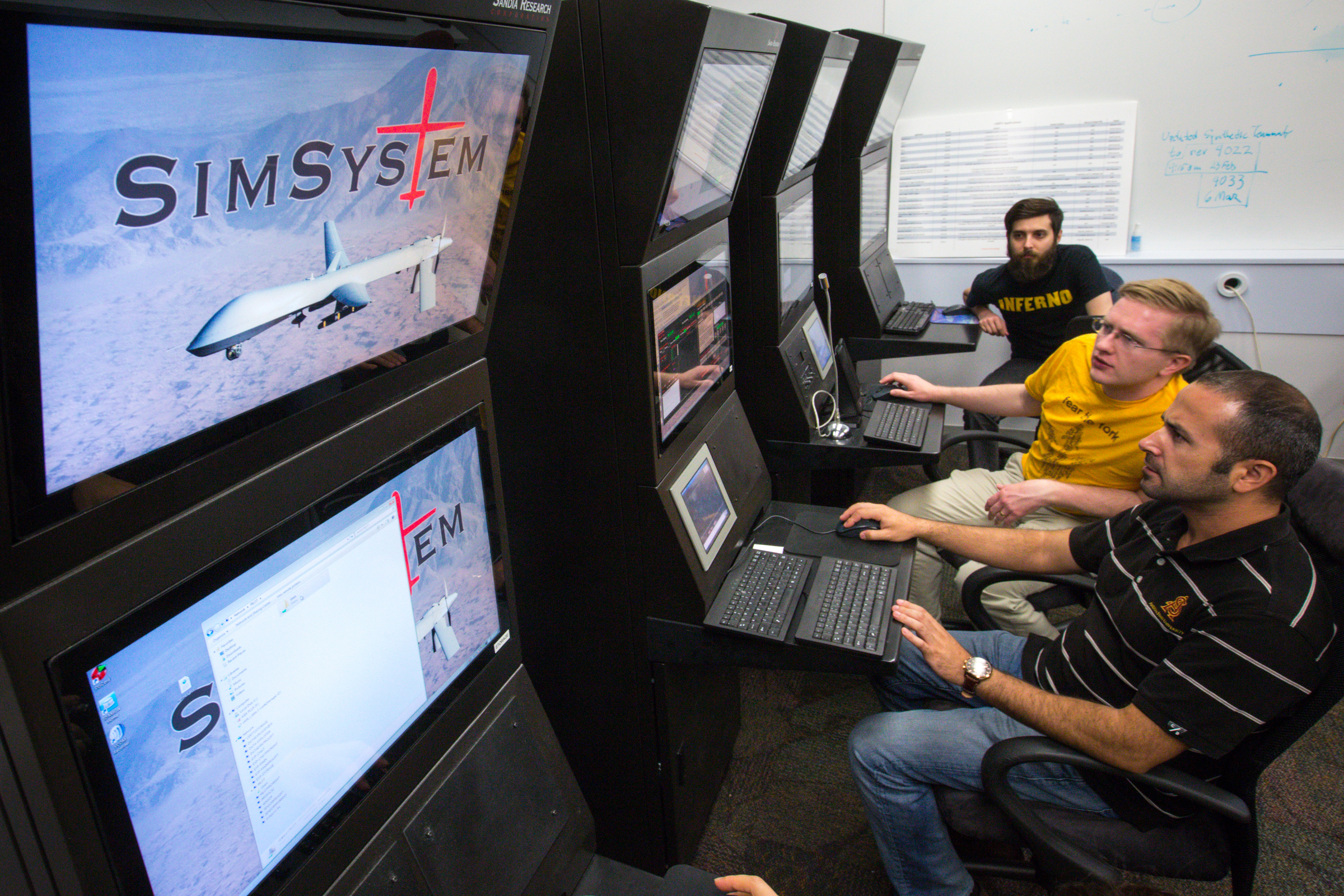Editor's note: Professors Nancy Cooke and Tom Sugar will be recognized for their work on military matters at Thursday's football game against Oregon, as part of ASU's Salute to Service. Read a profile of Sugar's work on wearable robotics here.
Students who have graduated with a master’s in applied psychology from the Polytechnic School at Arizona State University have gone on to help defend the nation. They teach at military colleges and work with drone pilots.
And occasionally they call or email Nancy Cooke and thank her.
“Excellent.” It's how she described her feelings about the results of her work helping people use technology better. “That’s one of the best compliments we can get; that the program not only gave them a master’s degree, but also practical use in the real world.”
Cooke is a human systems engineer.
“It’s putting humans in the center of technology, designing the technology systems around them, rather than vice versa,” she said. “It has a major psychological impact.”

ASU professor Nancy Cooke works with students in the Human Systems Engineering program.
Jessica Hochreiter/ASU; top photo: Charlie Leight/ASU Now
Along with veterans and active service members, Cooke will be recognized for her work Thursday when ASU’s football team plays Oregon as part of the university’s Salute to Service celebration.
“The students who have graduated from here ... value their education,” Cooke said. “I have one student now working at Creech Air Force Base (in Nevada) with (drone) pilots … I think our master’s program prepares them well for what they’re going to do, either in the military or the commercial sector.”
Cooke is a professor and program chair of Human Systems Engineering at the Polytechnic School, one of the Ira A. Fulton Schools of Engineering at ASU. As an undergrad at George Mason University in Virginia, she majored in foreign languages but found she enjoyed her introduction to psychology class.
“I also wanted to help people,” Cooke said. She did some peer counseling, but recognized going into clinical work was not for her. “I found it kind of boring,” she said.
She also liked her computer science classes. On a visit to career counseling, she discovered human factors, or engineering psychology as it was called then. It combined technology and computer science to help people use technology better.
“A lot of my work (with drones) has to do with teamwork, and how teams interface with a ground control station,” Cooke said. “I’ve been getting more interested in the psychosocial effects of the people who operate them.”
Students learn to program drone airplanes in the Cognitive Engineering Research on Team Tasks lab on the Polytechnic campus, run by professor Nancy Cooke. Charlie Leight/ASU Now
Cooke runs the Human Systems Engineering program on the Polytechnic campus, where students learn to design technology that works for humans. Her Cognitive Engineering Research on Team Tasks lab investigates human and team performance in cybersecurity systems, unmanned aerial systems, intelligence analysis, emergency medicine and more — all with the aim of better understanding human behavior and how that intersects with technology.
Her work is funded primarily by the Office of Naval Research, the Air Force Research Laboratory and the Army Research Office.
A single drone mission requires almost 200 people working together, according to Creech Air Force Base. They fly seven days a week, 365 days a year, over countries like Afghanistan, Syria and Yemen.
“Many people are coming to the realization that we are fighting warfare in a completely different way,” Cooke said. “We’re fighting it remotely, and drones are a part of that. But in many ways there are people who are on the battlefield remotely, but sitting in Langley, Virginia, or the Pentagon or Creech Air Force Base in Nevada. They all remotely fly to the battlefield.
“The question is what kind of effects does that have? Many people have likened flying drones to a video game, but to the operators it’s anything but a video game. It’s very real.”
A pilot flying a manned plane into combat will drop ordnance and get out. They never get to watch their targets for days on end. Drone operators survey a village day in and day out. They begin to learn how many people live in a particular house, how many kids they have, how people are living in the village. They get to learn the patterns of life.
After they fire on a target, they stay over the area, assessing battle damage. A pilot flying a plane almost never sees the effects on the target.
“That can be all too real, in a place they know pretty well,” Cooke said. “It’s not at all like a video game.”
There is post-traumatic stress disorder, but without the support they’d get overseas in a theater of war.
“That’s why I really got into this line of work,” Cooke said. “I wanted to have an impact, to see the results of my research do something good. There’s a lot of problems that can be addressed in national defense, especially with so many incredible changes happening in robotics, remote operations, and censored data exploitation, and it feels good to do something that has an impact.”
More Science and technology

ASU-led space telescope is ready to fly
The Star Planet Activity Research CubeSat, or SPARCS, a small space telescope that will monitor the flares and sunspot activity of low-mass stars, has now passed its pre-shipment review by NASA.…

ASU at the heart of the state's revitalized microelectronics industry
A stronger local economy, more reliable technology, and a future where our computers and devices do the impossible: that’s the transformation ASU is driving through its microelectronics research…

Breakthrough copper alloy achieves unprecedented high-temperature performance
A team of researchers from Arizona State University, the U.S. Army Research Laboratory, Lehigh University and Louisiana State University has developed a groundbreaking high-temperature copper alloy…



